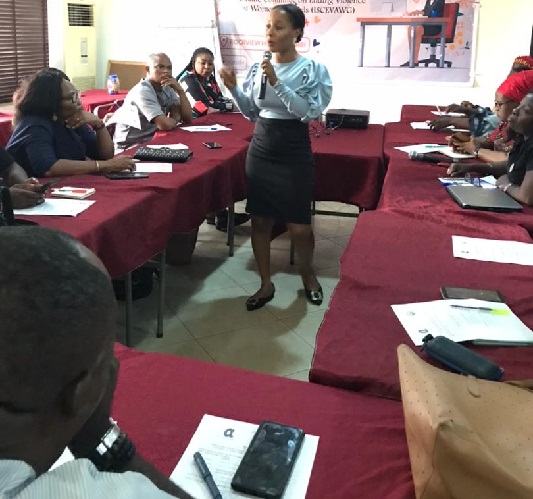By Onyinyechi Amakaulo
In a conscious bid to eradicate violence against women and girls in the state through policy change, the Imo state Committee on Ending Violence Against Women and Girls, ISCEVAWG, have held their first quarterly review meeting.
The meeting targeted at analyzing past efforts of the committee and strategizing ways to address emerging issues on violence against women and girls in the state, chaired by Alliances for Africa with support from the United Nations Trust Fund, UNTF, was held at Rockview hotel, Owerri.
Recall that the committee recorded a major milestone last year December, following the passing of the Imo state Violence Against Persons (Prohibition) bill, into law by the Executive Governor of Imo state, Sen. Hope Uzodinma.
The bill, sponsored by the member representing Njaba state Constituency, Hon. Uju Onwudiwe and championed by Alliances for Africa, the ISCEVAWG, and other civil society organizations, eventually became a law toward the tail end of 2021, after the law passed through its gazetting stage.
Speaking at the meeting, Alliances for Africa’s Programs officer, Faith Kalagbor commended members of the committee for their unwavering commitment last year, which led to the passage of the VAPP law in Imo state, while also reading out minutes from previous meeting.
In an interview with the Coordinator of the ISCEVAWG, Ms Marjorie Ezihe, she noted that the general feel of the VAPP among citizens in the state is low, hence the need for more efforts on sensitization and advocacies, as well as trial of cases using the VAPP law.
She noted that, when justice delivery systems try cases using provisions in the VAPP, and when state, non state actors and institutions are held accountable for their actions, then the legal instrument can be tried and improved on.
Major part of the deliberations were on the need to make the law operational by implementing fully all the provisions enshrined in the VAPP law.
As part of what worked for the committee, they listed collaborations with some police divisions, media, traditional institutions, advocacies and awareness as yielding positive results.
They listed funds for front line interventions, special or security protection for front line, lack of mobility, delay in administration of justice, funding to help survivors, absence of shelter, judicial representation of court proceeding, absence of data and documentation, lack of collaboration with religious leaders, NBA.
Others are, general insecurity in the state, police officers who have no understanding of human rights approach to handling survivors, relunctance of witness, lack of medical evidence, slow government system, sabotage from survivors as major challenges that impeded their efforts last year.
The committee who are not relenting on their effort to push for the implementation of the VAPP, proposed to leverage on advocacies to major stakeholders in the state for its smooth take off.
About The Author
You may also like
-
APP CONDEMNS GOVERNMENT’S ACT OF POLITICAL PETTINESS AND INTIMIDATION AGAINST CITIZENS
-
Chairman, Metropolitan Elites Asso, celebrates former ENTRACO GM, Jef Nwaoha, at his 50th birthday … Describes him as a charismatic leader
-
Imo House Of Assembly Passes #1.4trn 2026 Appropriation Bill Into Law
-
Oguta Lawmaker, Gilbert Nwosu Commends Uzodimma On Prudent Use Of State Resources, Salutes Him On Successful 2026 Budget Presentation




